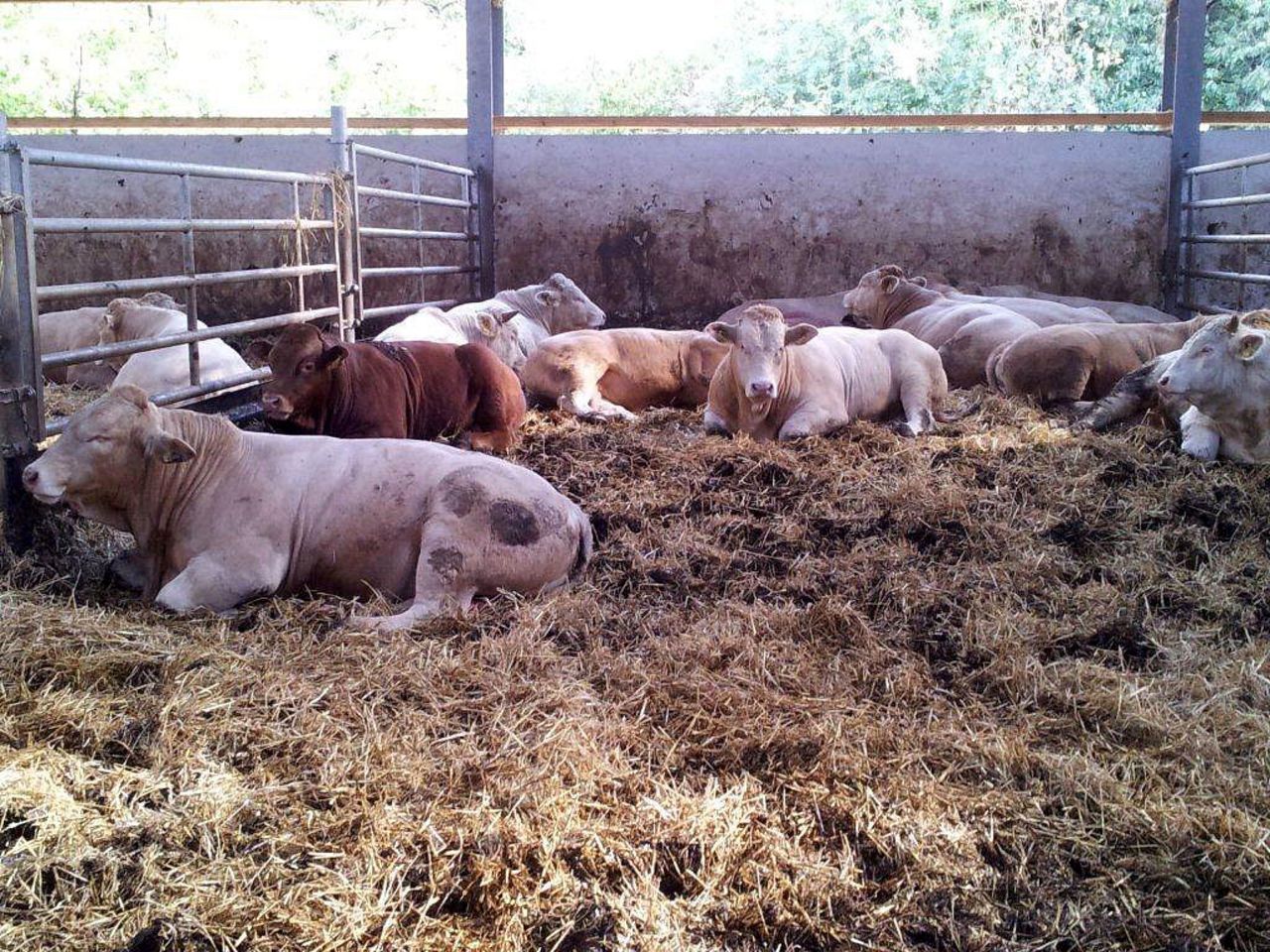Project
5-State-Evaluation: Effects on animal welfare

On-going evaluation of the Rural Development Programmes of five German federal states in the programming period 2014 - 2020: Effects on animal welfare
The Thünen Institute of Farm Economics evaluates the effects on animal welfare of the Rural Development Programs (RDP) of North Rhine-Westphalia, Hesse, Schleswig-Holstein and Lower Saxony/Bremen.
Background and Objective
Various measures under the RDP such as the farm investment support, farm advisory services or animal welfare payments, aim at improving animal welfare. We assess if they achieve this goal. To this aim, the following questions are crucial:
- Are the measures in principle suitable to achieve improvements in animal welfare?
- Which effects do the measures unfold on the supported holdings?
- What is the contribution of the measures to improve animal welfare in livestock farming and how efficient are they?
Evaluation of the effects on animal welfare takes place within evaluation of the whole Rural Development Programs.
Approach
To evaluate the effects of the various support measures, we use different methods and data-sources. Milk-inspection data, which contains information on the health status (i.e. mastitis, metabolic disorders) is used for the evaluation of the grazing premium in North-Rhine-Westfalia. The result-oriented animal welfare measure for pigs newly implemented in Lower-Saxony is accompanied in a first step by telefone- und written surveys on the administrative procedures and changes implemented on the supported farms. For Hesse and North-Rhine-Westfalia data from the Identification and Information System for Animals (HIT) is tested with respect to its use for evaluation puropses.
Data and Methods
For the analysis, we evaluate funding data (for example, animal numbers, funding amounts) but also self-collected data and information from statistical surveys. In addition to quantitative statistical methods (descriptive statistics, multivariate analyzes, differnce-in-difference & matching), we use qualitative methods (focus groups, content analysis).
Preliminary Results
Animal Welfare Payments (RDP-Measure M14)
For the evaluation of the result-oriented animal welfare measure for fattening pigs ("curly tail premium") and the action-oriented laying hen measure in Lower Saxony, written surveys were conducted at participating farms in the years 2017/2018. From these surveys, the following findings were obtained and conclusions and recommendations derived:
- The participating farms were largely satisfied with the administrative implementation of the new support measures.
- For the laying hen measure, the proportion of farms that had to make adjustments to participate was significantly lower than for the curly tail premium. This indicates high deadweight effects in the laying hen measure, which are partly due to the high proportion (about 70 %) of organic farms. These farms meet the majority of housing requirements per se.
- The laying hen measure is purely action-oriented with requirements on space, feeding, materials for investigation and manipulation etc. Due to the lack of result-orientation, holdings with a high degree of feather pecking and cannibalism have also received payments for animal-friendly husbandry. Therefore, inclusion of result-based components into the funding measure is recommended.
- For the curly tail premium, this result-orientation already exists. It represents a good approach to achieve the actual goal of promoting "intact animals". However, with the critical value of a minimum of 70 % intact curly tails, up to 30 % of the animals may suffer pain due to tail-biting. Therefore adjustments are recommended with respect to this threshold value.
- Of the farms participating in the curly tail premium, those with conventional housing practices (pens with fully slatted floors) had more difficulties in achieving a high proportion of intact tails than those with straw based systems. The scientific literature and a number of projects aiming to reduce tail biting on conventional farms confirm this result. It is therefore necessary to discuss whether the measure should be extended to include provisions defining the conditions for keeping intact animals.
Farm Investment Support
The evaluated federal states have different requirements with regard to the animal welfare of the supported stables. Lower Saxony/Bremen and Schleswig-Holstein, and since 2019 also Hesse, have more demanding funding conditions than North Rhine-Westphalia.
Based on a written survey of the recipients conducted in 2018, it was possible to determine that:
- some improvements could be implemented, whereby the deadweight effects reduce the influence of the funding,
- the requirements of Appendix 1 are not always sufficient for animal-friendly husbandry and
- only a few dairy farms converted from tie-stalls to loose housing.
A further orientation of the AFP towards the promotion of animal-friendly housing is recommended, whereby the promotion guidelines should be continuously adapted to the state of knowledge and non-animal-friendly methods should be excluded from the support.
Links and Downloads
Thünen-Contact

Duration
5.2015 - 12.2024
More Information
Project status:
ongoing
Publications to the project
- 0
Bergschmidt A, Schwarze S (2022) Analyse der Nutzbarkeit von Daten des Herkunftssicherungs- und Informationssystems für Tiere (HIT) für die Bewertung von Tierwohlwirkungen von ELER-Maßnahmen : Entwicklungsplan für den ländlichen Raum (EPLR) des Landes Hessen 2014 bis 2020 & NRW-Programm Ländlicher Raum 2014 bis 2020 [online]. Braunschweig: Thünen-Institut für Betriebswirtschaft, 28 p, 5 Länder Eval 2022/04, zu finden in <https://www.eler-evaluierung.de/fileadmin/eler2/Publikationen/Projektberichte/5-Laender-Bewertung/2022/4_2022-HIT-Daten_fuer_die_Evaluation_von_Tierwohlwirkungen.pdf> [zitiert am 18.05.2022], DOI:10.3220/5LE1652873075000
- 1
Pufahl A, Schwarze S, Roggendorf W, Sander A, Bathke M, Bergschmidt A (2022) Wirksamkeit und Effizienz der ELER-Förderung für Ressourcenschutz, Klimaschutz und Tierwohl. Ber Landwirtsch 100(1), DOI:10.12767/buel.v100i1.395
- 2
Bergschmidt A (2021) Evaluation der Tierwohl-Wirkungen des Agrarinvestitionsförderungsprogramms (AFP - TM 4.1 des EPLR) : Entwicklungsplan für den ländlichen Raum des Landes Hessen 2014 bis 2020 (EPLR) [online]. Braunschweig: Thünen-Institut für Betriebswirtschaft, 68 p, 5 Länder Eval 2021/01, zu finden in <https://www.eler-evaluierung.de/fileadmin/eler2/Publikationen/Projektberichte/5-Laender-Bewertung/2021/01_2021-HE-Tierwohl-Wirkungen_AFP.pdf> [zitiert am 21.01.2020], DOI:10.3220/5LE1579617952000
- 3
Grajewski R, Bergschmidt A, Reiter K, Roggendorf W, Sander A (2020) Beitrag für eine Anhörung der Enquetekommission Zukunft der Landwirtschaft des Landtags NRW : "Wie trägt das NRW-Programm Ländlicher Raum (ELER-Förderung) dazu bei, die hiesige Landwirtschaft zu unterstützen? Welche Funktionen der Landwirtschaft könnten mit ELER-Maßnahmen besser gefördert werden? Was muss bei der zukünftigen Gestaltung von ELER-Maßnahmen berücksichtigt werden, damit diese stärker zum Nutzen der Landwirtschaft eingesetzt werden?". Braunschweig: Johann Heinrich von Thünen-Institut, 28 p
- 4
Forstner B, Ebers H, Roggendorf W, Bergschmidt A (2020) Evaluation des Agrarinvestitionsförderungsprogramms (AFP - TM 4.1 des EPLR Hessen) : Entwicklungsplan für den ländlichen Raum des Landes Hessen 2014 bis 2020 (EPLR Hessen). Braunschweig: Thünen-Institut für Betriebswirtschaft, 87 p, 5 Länder Eval 2020/11, DOI:10.3220/5LE1579695420000
- 5
Forstner B, Ebers H, Roggendorf W, Bergschmidt A (2020) Evaluation des Agrarinvestitionsförderungsprogramms (AFP - TM 4.1 des EPLR): Befragungsergebnisse der AFP-Zuwendungsempfänger*innen : NRW-Programm Ländlicher Raum 2014 bis 2020. Braunschweig: Thünen-Institut für Betriebswirtschaft, 67 p, 5 Länder Eval 2020/16, DOI:10.3220/5LE1603696465000
- 6
Forstner B, Ebers H, Bergschmidt A, Schwarze S (2020) Evaluation des Agrarinvestitionsförderungsprogramms (AFP - TM 4.1): Ergebnisse der Befragung der Zuwendungsempfänger*innen : Landesprogramm ländlicher Raum (LPLR) des Landes Schleswig-Holstein 2014 bis 2020. Braunschweig: Thünen-Institut für Betriebswirtschaft, 55 p, 5 Länder Eval 2020/07, DOI:10.3220/5LE1592313813000
- 7
Grajewski R, Bathke M, Bergschmidt A, Eberhardt W, Ebers H, Fengler B, Forstner B, Franz K, Gröner C, Peter H, Pollermann K, Pufahl A, Raue P, Reiter K, Sander A, Roggendorf W (2019) Ergebnisse der laufenden Bewertung von PFEIL : Beitrag zu Kapitel 7 des erweiterten Durchführungsberichts 2018. Braunschweig: Thünen-Institut für Ländliche Räume, 207 p, 5 Länder Eval 2019/13, DOI:10.3220/5LE1567668169000
- 8
Bergschmidt A (2019) Tierwohlmaßnahme des PFEIL - Programms 2014 bis 2020 : besonders tiergerechte Haltung von Mastschweinen "Ringelschwanzprämie" (T2). Braunschweig: Thünen-Institut für Betriebswirtschaft, 50 p, 5 Länder Eval 2019/4, DOI:10.3220/5LE1550753499000
- 9
Fährmann B, Grajewski R, Bergschmidt A, Fengler B, Franz K, Pollermann K, Raue P, Roggendorf W, Sander A (2018) Der ELER in der Gemeinsamen Agrarpolitik nach 2020 : wie bewerten EvaluatorInnen die europäischen Verordnungsentwürfe? Braunschweig: Johann Heinrich von Thünen-Institut, 52 p, Thünen Working Paper 107, DOI:10.3220/WP1540817931000
- 10
Grajewski R, Bathke M, Bergschmidt A, Eberhardt W, Ebers H, Fährmann B, Fengler B, Flint L, Forstner B, Franz K, Peter H, Reiter K, Roggendorf W, Sander A, Schnaut G (2018) NRW-Programm Ländlicher Raum 2014 bis 2020 : Analyse der Inanspruchnahme und Umsetzung. Braunschweig ; Hannover: Thünen-Institut für Ländliche Räume ; entera, 208 p, 5 Länder Eval 2018/9, DOI:10.3220/5LE1541074874000
- 11
Fährmann B, Bergschmidt A, Bathke M, Eberhardt W, Ebers H, Fengler B, Flint L, Forstner B, Grajewski R, Pollermann K, Reiter K, Roggendorf W, Sander A (2018) PFEIL - Programm zur Förderung im ländlichen Raum 2014 bis 2020 in Niedersachsen und Bremen : Analyse der Inanspruchnahme und Umsetzung. Braunschweig ; Hannover: Thünen-Institut für Ländliche Räume ; entera, 355 p, 5 Länder Eval 2018/8, DOI:10.3220/5LE1543226002000
- 12
Bergschmidt A, Brinkmann J, Renziehausen C, March S (2017) Evaluating 'Animal Welfare Payments' of the EUs Common Agricultural Policy. In: Jong IC, Koene P (eds) Proceedings of the 7th International Conference on the Assessment of Animal Welfare at Farm and Group Level : WAFL 2017 ; Ede, The Netherlands ; September 5-8, 2017. Wageningen: Wageningen Academic Publ, p 168
- 13
Bergschmidt A (2017) Tierwohl - Definitionen, Konzepte und Indikatoren. Land Raum 30(3):4-6

![[Translate to English:] Logo des Bundesministerium für Ernährung und Landwirtschaft](/media/allgemein/logos/BMEL_Logo.svg)